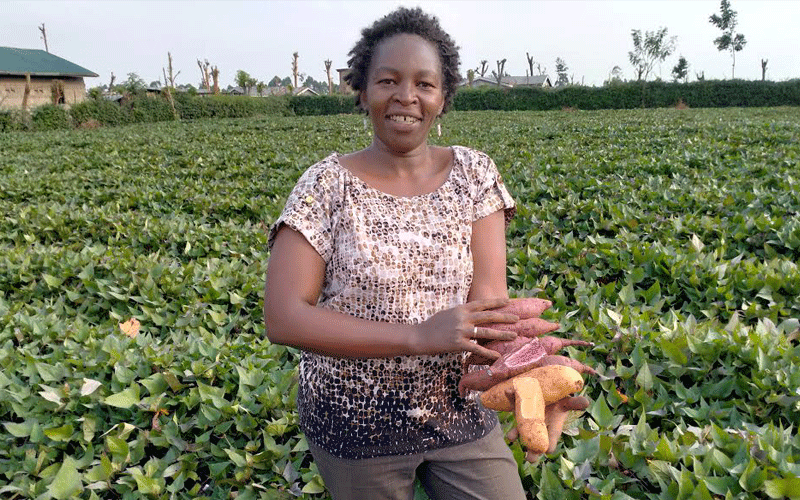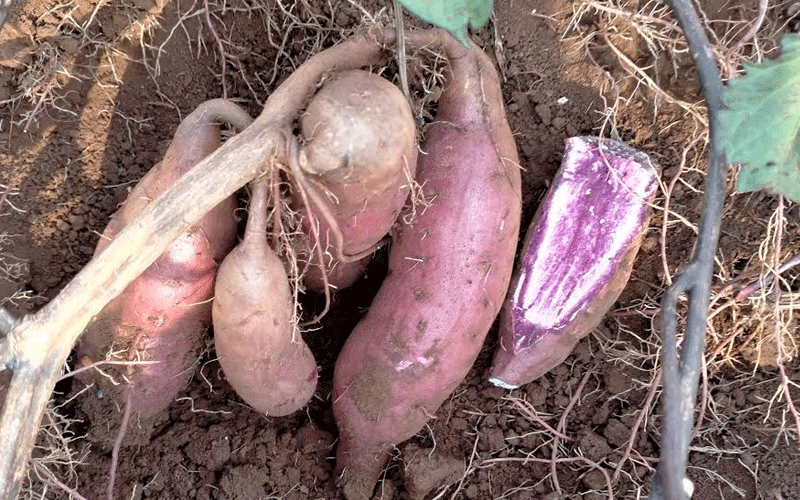Murang’a farmer finds fortune in rare sweet potato varieties

Milliam Murigi @millymur1
It is harvest time at Wambui Kiragu sweet potato farm when we visit.
Wambui, popularly known as Sara Murimi, grows premium orange and purple-fleshed sweet potatoes in a two-acre family farm in Mugumo-ini, Kirimiri sub-location of Maragua, Murang’a county.
Her farming journey started right after she completed her university studies in 2014, when she began growing onions and capsicum, then ventured into paw paw and water melon business.
However, the learning curve was steep as she had underrated some factors, such as consistent availability of water, the cost and quality of labour and security.
As a result, she lost a whole crop of onions when her water pump broke down and her water melon field was cleared by thieves a night before harvesting.
As a ‘telephone-farmer’ (farmers who remotely run the farm via the telephone), her farm manager would also connive with agrovet shops to inflate prices and volume of inputs. Tired of all these challenges, she decided to take a break to reflect.
“When I ventured into farming I had big dreams. But I wish I knew better. I wouldn’t have started with the so-called high value crops.
I would have chosen a crop, such as sweet potatoes, which allows one to learn at a fair pace before upgrading,” recounts Wambui.
She tried her luck in the farm again two years later, but this time round, she settled on sweet potatoes, which are not labour intensive and don’t require a lot of farm inputs and water, have distinct harvesting time and good market value.

She went for the orange-fleshed variety know for its nutrious value. This variety is packed with betacarotene, an important vitamin good for eyesight and the purple-fleshed variety that has anti-cancer nutrient called anthocyanin.
Rare varieties
“I did extensive research on these two varieties and I could clearly see their untapped potential.
I also realised that the two varieties were not widely available thus making them more expensive compared with other varieties,” she recounts.
Her next step was to visit the Kenya Plant Health Inspectorate Service (KEPHIS) for her seedlings as well as advise on the agronomy of growing sweet potatoes.
KEPHIS runs a tissue culture lab of sweet potatoes to ensure that farmers get clean and disease-free planting materials.
And the plant didn’t disappoint. Three and half months later, it was ready for harvesting.
At first she had challenges marketing the orange-fleshed sweet potatoes because her customers, mainly her neighbours would over-cook them and then report that they were soggy, impacting her sales.
She had to introduce cooking lessons to them and since then the business is growing, leading to another challenge!
The capacity to meet the quality and quantity requirements.
“On quantity, I am still unable to provide consistent volumes to meet the demands of my regular clients, but am working hard to expand the farm since the demand is there,” she says.
And to ensure she minimises on post-harvest losses, she says that she harvests her produce once the leaves and end of the vines start turning yellow because if sweet potatoes overstay in the soil, they can be attacked by weevils, which make grooves on the tubers thus lowering their market quality.
Apart from that, if the tuber overstays in the soil, they also become too big, which is not desirable by the market.
Online marketting
Wambui says that her biggest clientele are her neighbours in Nairobi, whe she lives and works as aresearcher in urban food systems.
She markets the potatos through their neighborhood resident association’s WhatsApp group and also sells through social media platforms, the likes of Digital Farmers Kenya.
She has also linked up with a trader who arranges home grocery deliveries and picks 100kgs every week.
She is currently trying to link up with restaurants as they slowly start picking up from the impacts of Covid-19.
Wambui, who graduated with an environmental studies degree and has a broad experience in sustainable agriculture, says that her plan is to go into processing and provide a market for farmers.
And to ensure this is a success, especially when it comes to quantity, she has started distributing vines to her neighbours in Kirimiri Sub-Location for free.
She also sells the vines at a nominal fee and so far, she has a network of farmers in over 25 counties who have bought and are planting the purple-fleshed variety.
“With the new craze of no-wheat diet, I want to make a difference in people’s diet as they try to cut on wheat consumption and go back to traditional foods.
I wish that every farming household grows these nutritious varieties of sweet potatoes.
In providing a market, I will be able to make a difference in women farmers lives.”
To her orange-fleshed sweet potatoes fetches a better market because it can be used in different recipes.
Apart from the normal way of boiling and eating, it can also be used to make chapati, mandazi, doughnuts, chips, crisps among other meals.
For the purple-fleshed variety, the brilliant colour and health benefits command a higher price, opening a potentially profitable niche market.
Her advise to anyone wishing to venture into farming is that they should carefully choose their learning curve.
“Do not start with the so-called high value crops because chances of starting with failure are high.
Sweet potatoes allow you to learn more than the actual agronomy of a crop, for instance, labor management, marketing and so on,” she offers.












